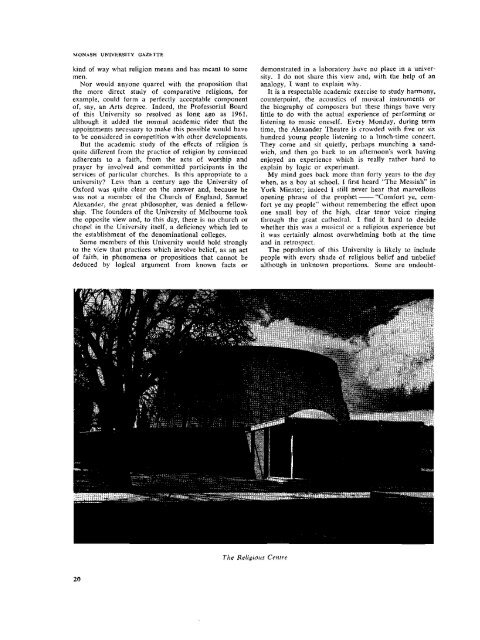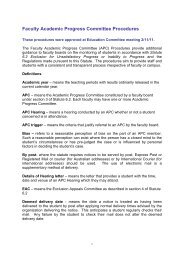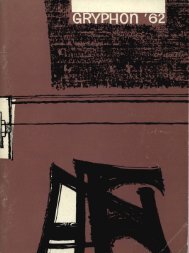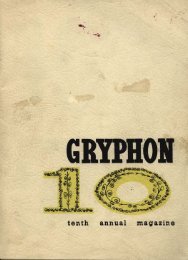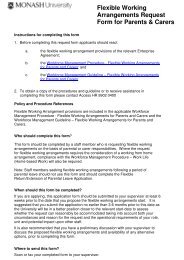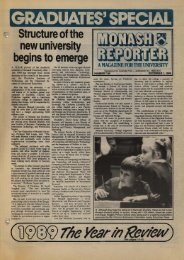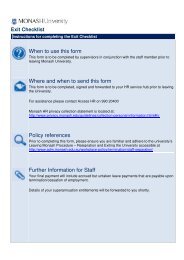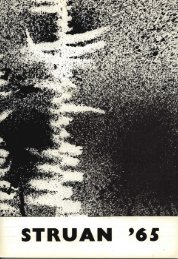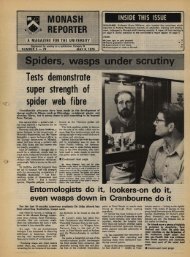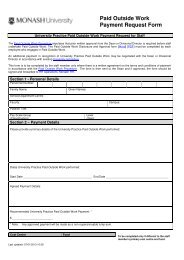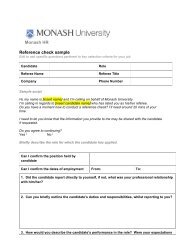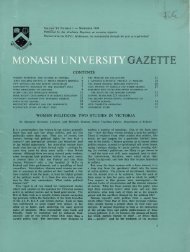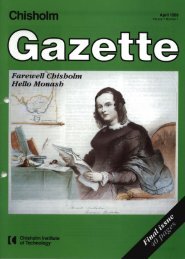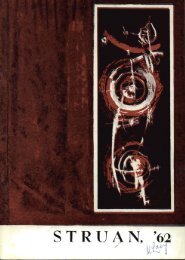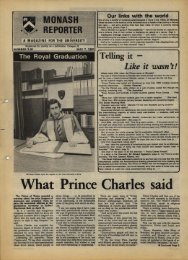MONASH UNIVERSITY GAZbTTEkind of way what religion means and has meant to somemen.Nor would anyone quarrel with the proposition thatthe more direct study of comparative religions, forexample, could form a perfectly acceptable componentof, say, an Arts degree. Indeed, the Professorial Boardof this <strong>University</strong> so resolved as long ago as 1961,although it added the normal academic rider that theappointments necessary to make this possible would haveto be considered in competition with other developments.But the academic study of the effects of religion isquite different from the practice of religion by convincedadherents to a faith, from the acts of worship andprayer by involved and committed participants in theservices of particular churches. Is this appropriate to <strong>au</strong>niversity? Less than a century ago the <strong>University</strong> ofOxford was quite clear on the answer and, bec<strong>au</strong>se hewas not a member of the Church of England, SamuelAlexander, the great philosopher, was denied a fellowship.The founders of the <strong>University</strong> of Melbourne tookthe opposite view and, to this day, there is no church orchapel in the <strong>University</strong> itself, a deficiency which led tothe establishment of the denominational colleges.Some members of this <strong>University</strong> would hold stronglyto the view that practices which involve belief, as an actof faith, in phenomena or propositions that cannot bed<strong>edu</strong>ced by logical argument from known facts ordemonstrated in a laboratory have no place in a university.I do not share this view and, with the help of ananalogy, [ want to explain why.It is a respectable academic exercise to study harmony,counterpoint, the acoustics of musical instruments orthe biography of composers but these things have verylittle to do with the actual experience of performing orlistening to music oneself. Every Monday, during termtime, the Alexander Theatre is crowded with five or sixhundred young people listening: to a lunch-time concert.They come and sit quietly, perhaps munching a sandwich,and then go back to an afternoon's work havingenjoyed an experience which is really rather hard toexplain by logic or experiment.My mind goes back more than forty years to the daywhen, as a boy at school, [ first heard "The Messiah" inYork Minster; indeed [ still never hear that marvellousopening phrase of the prophet--"Comfort ye, cornfortye my people" without remembering the effect uponone small boy of the high, clear tenor voice ringingthrough the great cathedral. [ find it hard to decidewhether this was a musical or a religious experience butit was certainly almost overwhelming both at the timeand in retrospect.The population of this <strong>University</strong> is likely to includepeople with every shade of religious belief and unbeliefalthough in unknown proportions. Some are undoubtThe Religions Centre26
edly atheist, denying the existence of a deity; some areknown to be practising: Christians; but in all probabilitymany would describe themselves as agnostics, neitheradhering to the tenets of any particular religion norquite ready to assert that there is no God. Some ofthese, acknowledging behaviour in man that is hard toexplain in materialistic terms, might find it impossible toconceive of an independent, external God somewhere upthere in the space-time continuum, but are able to seethat from such metaphoric phrases as "God is Love" canbe built an elementary but acceptable theology.If any of these should wish to test the validity ofreligious experience for themselves there is no alternativeto participating in religious experience by sharingin worship. just as one cannot appreciate the effect ofmusic except by listening to it. This be<strong>au</strong>tiful building,set in the middle of the <strong>University</strong>, will always be opento every reverent visitor who cares to enter, whether topray, or to share in service, or just to sit in silentcontemplation.One final word: when the Council finally agreed tothe construction of the Centre it emphasized that "theCentre should not be restricted to members of a particularfaith". It is a matter for rejoicing that recentdevelopments are such that people of so many differentfaiths have found it possible to join together to createthis Centre.Let the honesty, the determination and the tolerancethat have been shown in the building of this Centre bean inspiration to <strong>Monash</strong> <strong>University</strong> for all time.THE WILFRED FULLAGAR MEMORIALLECTUREA fund, The Wilfred Fullagar Memorial Fund, has beencreated for the purpose of establishing lectures to perpetuatethe memory of Sir Wilfred Kelsham Fullagar,former Justice of the High Court of the Commonwealthof Australia.Given by distinguished lawyers and members of professionsconcerned with legal matters, The Wilfred FullagarMemorial Lecture is to be held at least biennially.It will be related to current trends in and developmentsof legal thought.The in<strong>au</strong>gural lecture took place in the AlexanderTheatre on ~6 May 1968 at 8.15. Sir Robert Menziesintroduced the lecture series and spoke of his personalmemories of Sir Wilfred Fullagar.The lecture itself, "Australia and the Judicial Committeeof the Privy Council", was delivered by SirDouglas Menzies, a Justice of the High Court of Australia.As an introduction to his lecture on PrivyCourt appeals Sir Douglas told of his own associationwith Sir Wilfred Fullagar of whom he said:"His judgments have the quality of works of art inthe Greek tradition of deep simplicity which so muchinformed his writing and his thinking. There is however.no record, save in the hearts and minds of his colleagues,of the influence he exercised upon the deliberationsof the court and of the enrichment of judicial lifethat flowed from his gracious, good-humoured and encouragingpresence. He was greatly loved".LONDON APPOINTMENT FORREV. J. HAWKESThe Reverend Job Hawkes, who was a vital and colourfulpersonality around the campus. left <strong>Monash</strong> at theend of 1967 to spend a year in the United States andCanada before taking up an appointment in London.A graduate of the <strong>University</strong> of Cambridge, ReverendHawkes worked in the United Kingdom, Trinidad, KingIsland and Hobart. During his stay in Hobart, he alsot<strong>au</strong>ght history part-time at the <strong>University</strong> of Tasmania.In 1962 he became a chaplain at <strong>Monash</strong> and in 1965joined the department of History as a senior teachingfellow.He will be remembered by students and staff for hisfriendly counsel, resourcefulness and generosity.The Fable in the ChapelNEW DEPARTMENT OF SURGERYA new department of Surgery, which is headed by ProfessorH. A. F. Dudley, has been established in the<strong>Monash</strong> Medical School at the Alfred Hospital.On Friday 26 July Mr. B. K. Rank, former presidentof the Australasian College of Surgeons, opened thedepartment which is on one of the three floors added tothe original medical school building. The new buildingis wired for closed-circuit television and has a highlyinstrumentedanimal operating theatre.Three of the students in the new department are work.ing for a Bachelor of Medical Science degree in combinationwith the usual medical degrees a relativelynew step in Australian teaching practice.21


